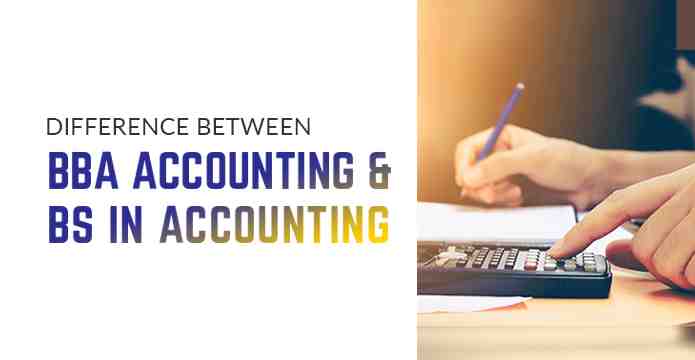Difference between BBA accounting and BS accounting- Choosing a degree depends on your career aspiration. Earning a degree in accounting is not as easy as taking accounting tuitions from an xyz institution. Most importantly, you should decide which type of accounting degree you desire to study. There are two popular choices. One is a Bachelor of Business Administration(BBA) in accounting. Two, BS in Accounting. These two courses seem identical but the duo has tremendous differences. If you are planning to go ahead with any of these two, then you should understand them well before diving into the conclusions.
Firstly, Both are two diverse fields of study.
BBA in Accounting involves and focuses on business and management studies into the degree curriculum. BBA in Accounting degree concentrates on administration.
On the contrary, BS in Accounting focuses on mathematical and technical aspects when it comes to the course curriculum. BS in Accounting focuses on technical discipline.
Secondly, The Course curriculum.
BBA in Accounting course combines general business management classes as well as technical classes together.
BS in Accounting teaches the basic knowledge and skills required to perform efficiently in the accounting profession.
Thirdly, The Course Intent.
BBA in Accounting aims to ensure a deeper understanding of theoretical as well as practical knowledge regarding the functioning of accounting within the complete businesssphere.
BS in Accounting course curriculum incorporates immense and crucial financial skills and critical accounting course assignments to ensure learning and skill development on the same.
Fourth, What will you study & what are the future prospects?
In BBA in Accounting Course, the nature of the study incorporates a comprehensive analysis of financial accounting to operations management including federal income taxation. The vast learning ensures the BBA in Accounting graduates with more career flexibility in departments and as well in industries.
Whereas, the study curriculum of BS in Accounting enables a learner to get acquainted with the fundamentals of ethics, professional excellence, strategic thinking aptitudes, and leadership skills. A general BS in Accounting degree curriculum contains a myriad of business principles such as statistics, law, economics & corporate finance, etc. Once you graduate, you will possess both technical skills and financial proficiency required in a professional accountant.
Also Read: BBA Accountancy, Taxation & Audit
Fifth, The coursework in a hindsight.
BBA in Accounting Course combines the study of both financial and business apt curriculums. The meticulous study includes advanced accounting, auditing, financial reports & statements. Furthermore, internal audit and class assignments will help assess the conceptual outline of auditing strategies and procedures. It will help you to learn better regarding the proficiency bars/ benchmarks and the relevant tasks of internal auditors. There will be lectures on financial accounting, tax, corporate & management accounting.
BS in Accounting Course is rather more focused on specialized skills. The curriculum is designed to teach business communication skills for a wide range of interactive mediums. This includes email and other software programs. You will be taught to use technology. As accountants are continually obliged to think critically and ethically while in making quick decisions. Additionally, the accountant professionals should know the use of the method of translating numerical data and statistics into a practical way and business viewpoint. There will be lectures provided on the fundamental standards of accounting that would comprise accountancy planning, regulating and management.
Sixth, Career Flexibility.
A successful degree in BBA attracts a bunch of career opportunities in various industries. Thedegreeensuresaplethoraofcareeroptionsto choose or switch depending on your inclination & skills.
BS in Accounting equips you with vast technical skills in the field of accounting. The course is designed to cater to the interest of that are with a specific goal or have the sole intent to take up a career as an accountant.









